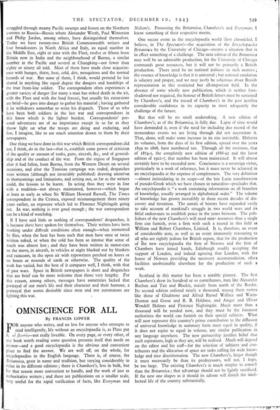OMNISCIENCE FOR ALL
By FRANCIS GOWER
FOR anyone- who writes, and no less for anyone who attempts to read intelligently, life without an encyclopaedia is, as Plato put it, oZ Stun-Os—not really liveable. On every page, or every other, of any book worth reading some question presents itself that needs an answer—and a good encyclopaedia is the obvious and convenient place to find the answer. We are well off, on the whole, for encyclopaedias in the English language. There is, of course, the Britannica, great in name and tradition, but varying considerably in value in its different editions ; there is Chambers's, less in bulk, but for that reason more convenient to handle, and the work of just as authoritative writers ; and there are publications on a smaller scale, Very useful for the rapid verification of facts, like Everyman and Nelson's. Possessing the Britannica, Chambers's and Everyman, I know something of their respective merits.
One recent event in the encyclopaedia world (first chronicled, I believe, in The Spectator)—the acquisition of the Encyclopaedia Britannica by the University of Chicago—creates a situation that is in effect something of a challenge. The next edition of the Britannica may well be an admirable production, for the University of Chicago commands great resources, but it will not be primarily a British production. There need be no national jealousy in such matters ; the essence of knowledge is that it is universal ; but national emulation is salutary and proper, and we may justly be solicitous about British representation in this restricted but all-important field. In the absence of some wholly new publication, which is neither fore- shadowed nor requited, the honour of British letters must be sustained by Chambers's, and the record of Chambers's in the past justifies considerable confidence in its capacity to meet adequately the challenge of the future.
But that will be no small undertaking. A new edition of Chambers's, as of the Britannica, is fully due. Lapse of time would have demanded it, even if the need for including due record of the tremendous events we are living through did not necessitate it. That, alone, will make some increase in its size inevitable. Hitherto its volumes, from the days of its first edition, spread over the years 1859 to 1868, have numbered ten. Through all the revisions, that of 1874-5, the completely new edition of 1888-92 and the latest edition of 1922-7, that number has been maintained. It will almost certainly have to be exceeded now. Conciseness is a sovereign virtue, particularly in a work of reference, but it must never be achieved in an encyclopaedia at the expense of completeness. The very definition —almost intimidating in its scope—of the late Latin transliteration of pseudo-Greek which we have chosen to naturalise—precludes that. An encyclopaedia is "a work containing information on all branches of knowledge, usually arranged in alphabetical order." The volume of knowledge has grown incredibly in these recent decades of dis- covery and invention. The annals of history have expanded vastly to take account of mankind's struggle in two world wars and its fitful endeavours to establish peace in the years between. The pub- lishers of the new Chambers's will need mor,! resources than a single firm can furnish, even a firm with such a record in this field as William and Robert Chambers, Limited. It is, therefore, an event of considerable note, as well as an event immensely reassuring to all who are rightly jealous for British repute, that for the production of the new encyclopaedia the firm of Newnes and the firm of Chambers have joined hands, Edinburgh readily accepting the support of London, and indeed agreeing that London, with the house of Newnes providing the necessary accommodation, offers facilities unobtainable elsewhere for the production of such a work.
Scotland in this matter has been a notable pioneer. The first Chambers's drew its hundred or so contributors, men like Alexander Buchan and Tait and Blackie, mainly from north of the Border. Its second edition enlisted nearly a thousand, among them names like those of Gladstone and Alfred Russel Wallace and Watts- Dunton and Gosse and R. B. Haldane, and Ainger and Oliver Wendell Holmes and Florence Nightingale. Much more than a thousand will be needed now, and they must be the foremost authorities the world can furnish on their special subjects. What will now represent this country's prime contribution to the diffusion of universal knowledge in summary form must equal in quality, if it does not aspire to equal in volume, any similar publication in any language anywhere. The new partnership justifies belief that such aspirations, high as they are, will be realised. Much will depend on the editor and his staff—for the selection of subjects and con- tributors and the allocation of space are tasks calling for wide know- ledge and nice discrimination. The new Chambers's, larger though it must necessarily be than its predecessors, will not, I hope, be too large. The existing Chambers's is much simpler to consvlt than the Britannica ; that advantage should not be lightly sacrificed. If the new one shapes as it should its advent will enrich the intel- lectual life of the country substantially.


























 Previous page
Previous page